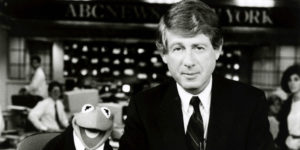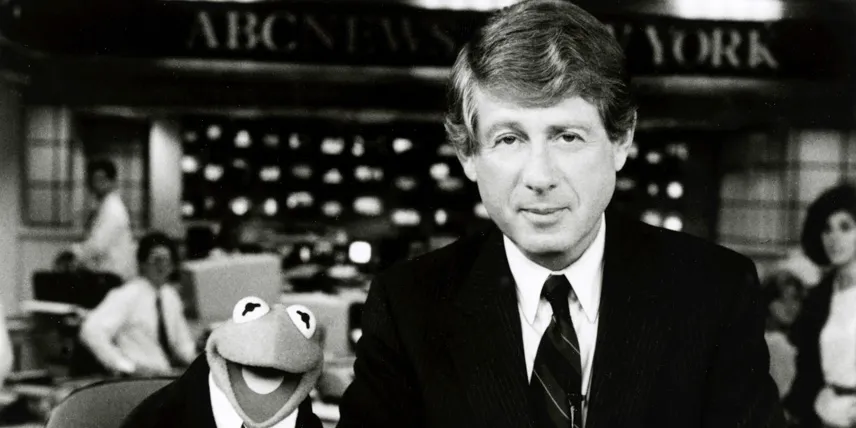Ted Koppel M.A. ’62, the multi award-winning news anchor and managing editor of ABC’s “Nightline” and one of America’s longest-serving journalists, shared in an interview with The Daily his disappointment with the rise of opinion-based reporting, support for reinstating compulsory national service and passionate defense of civil discourse.

Ted Koppel and Kermit the Frog on “Nightline” set. (ABC/LESLIE WONG)
Koppel returns to Stanford this year as the Mimi and Peter E. Haas Distinguished Visitor, a program awarded by the Haas Center to an individual whose career has served the public in a significant way.
State of journalism
Koppel lamented what he described as the decline of journalistic standards, which he said has arisen from the media’s financial incentive to profit from the public’s desire for sensation and scandal.
“So much of journalism today is, in fact, energized by a need to entertain rather than inform,” Koppel said. “The reason for this is that the people who own these very entities discovered that something that ultimately entertains an audience is going to make more money for the newspaper, the radio station [and] the television network.”
Although he acknowledged that news organizations are reaping financial rewards from Donald Trump’s presidency in terms of a surge in newspaper subscriptions and soaring circulation rates, Koppel maintains that the coverage is excessive and journalism is “suffering because of it.”
“I understand that Donald Trump and what he represents constitute an important story,” Koppel said. “But he’s not the only story out there right now, and there are other stories of importance that deserve coverage.”
Moreover, Koppel expressed disappointment in news reporters whose personal and political opposition to Trump, he believes, has compromised the objectivity of their reporting.
“You cannot read [The New York Times] without coming to the conclusion that almost everybody who works for the organization would like to see Donald Trump replaced,” Koppel said. “Other than on their op-ed pages, I don’t really want to know what the opinion or political outlook of the reporter.”
He traced the widespread decline in objective reporting back to the birth of the Internet. While the Internet has democratized journalism, Koppel said, it is also undermining fact-based journalism because online bloggers might disregard the rigorous fact-checking requirements of an established newspaper and indulge in clickbait.
“I believe the Internet has been very dangerous in that sense,” Koppel said. “It’s a marvelous tool, but like any tool, it can be used for good or evil.”
Ultimately, Koppel believes that good journalism is a skilled trade — “it’s not brain surgery” — and requires an educated mind and the ability to write well and clearly.
“[Journalists should] take a complex issue and reduce it to a fairly simple level, so that it can be understood by a great many people without in anyway distorting the reality of the story,” Koppel said. “That’s good journalism.”
Compulsory national service
During his 10-week residency at the Haas Center, Koppel said he wants to promote mandatory military and civilian service.
“I’m talking about reinstituting the draft — the military draft,” Koppel explained, “but [also] giving 18-year-olds the option of not going into the military and going into the social or humanitarian side.”
America has had an all-volunteer military force since 1973, when military conscription ended. The U.S. has also offered the option of doing social work through alternative programs, such as the Civilian Public Service during the Second World War. Koppel has called on the support of former senators Jay Rockefeller of West Virginia and Allen Simpson of Wyoming. Now he seeks to collaborate with others, including faculty at Stanford, on the idea.
Koppel believes national service would unite a politically and socially fragmented America, which he said is more divided than it has been in the last 50 years.
“The only thing that can ultimately bring the country back together again, that will get us out of our individual opinion silos, out of this sort of tribalism,” Koppel argued, “is if we require our young people to work with other young people from other parts of the country from different backgrounds.”
Koppel first became interested in the idea of national mandatory service while he was researching his book “Lights Out: A Cyberattack, A Nation Unprepared, Surviving the Aftermath.” Published in 2015, the book warns of a cyberattack on the U.S. power grid that could have nightmarish consequences and leave America in a blackout for months. While Koppel’s current interest in national service transcends his earlier work on cybersecurity, his research made him realize how woefully unprepared he and millions of Americans would also be if such a catastrophe occurred.
“I couldn’t fix a roof; I couldn’t fix a leaking toilet; I couldn’t shoot and skin and cure a deer, so that my family has meat for the winter,” Koppel said.
Consequently, he thinks that reintroducing the national service would help young people overcome social differences and equip them with a number of skills, including the ability to survive a national catastrophe.
Civil discourse
Koppel urged college students to listen to and even entertain ideas that clash with their own. He warned against college campuses limiting free speech as a means of combating hate speech, supporting Stanford’s decision not to ban Robert Spencer, director of Jihad Watch, from speaking on campus in November last year.
“Most college students are too young to justify having a rigid, unchangeable, implacable mind-set,” Koppel said. “Leave your mind open to a point of view that opposes your own. That’s why I’m hardly in favor of hate speech, but I am in favor of free speech,” adding that the two terms are often conflated with dangerous consequences.
Koppel said he employed this open-mindedness as a news anchor and managing editor of “Nightline” for 26 years. In fact, the guests he remembers enjoying the most were the ones who held opposing points of view to him.
“It became a self-imposed discipline that I would not reach a conclusion about my guests,” Koppel said. “Even if I hated what they were saying, I would love listening to anyone who can make a strong argument.”
Koppel will engage in this form of debate in a Cardinal Conversation with Anne Applebaum on “Real and Fake News” on April 9. The format of this new series hosted by the Hoover Institution reminded Koppel of his previous work.
“I did 6000 programs like that, and we called it ‘Nightline’,” he quipped.
Speaking to the Stanford graduating class of 1986 in his first commencement address, Koppel delivered a similar warning that America was becoming a “nation of electronic voyeurs, whose capacity for dialogue is a fading memory.” He gave his second commencement speech in 1998 where he called for graduates to “aspire to decency” and “practice civility to one another.”
Koppel said he has enjoyed being back on The Farm so far and engaged with “a lot of nice, interesting people” but admitted that “the most significant thing that happened to me here was not my education but meeting my wife,” Grace Anne Dorney, M.A. ’67.
Koppel will be in residence at the Haas Center for a 10-week period during winter and spring quarter and will be available to engage in dialogue with students on issues of free speech, the media and cybersecurity. He will deliver a lecture entitled “Public Service and the University” on April 18.
Contact Yasmin Samrai at ysamrai ‘at’ stanford.edu.
